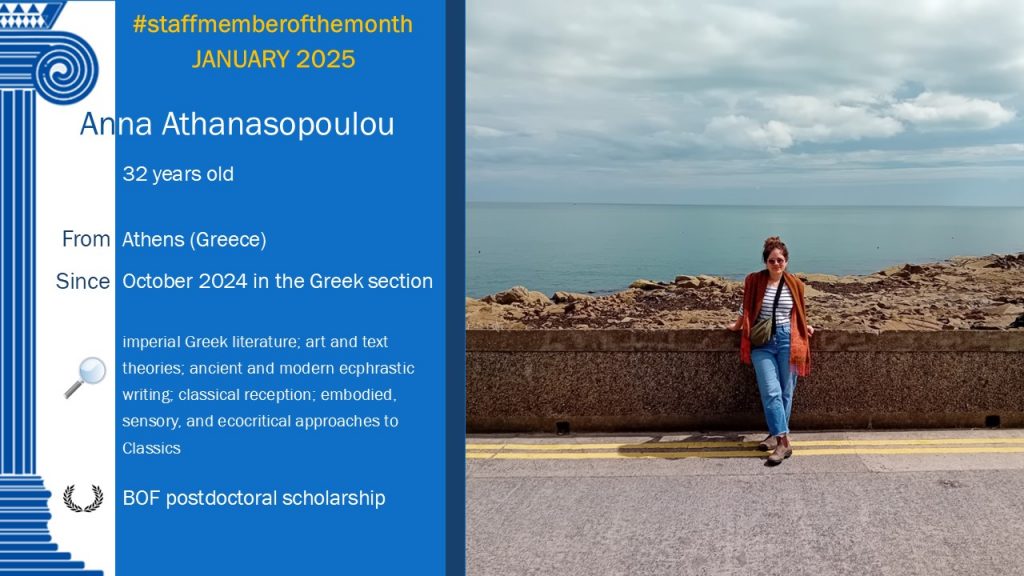This month’s featured staff member is Anna Athanasopoulou, who recently started her postdoctoral fellowship at Ghent. Her project explores art, ecocriticism, and the body in Imperial literature. We asked her about her new research, academic journey, and first impressions of Flanders.

Hello, Anna! You joined our department in October after receiving a BOF postdoctoral scholarship—congratulations! Could you tell us a bit more about your project?
Certainly! My current project looks at representations of human-nature entanglement in the Greek literature and art of the Roman empire (ca. 1st-5th c. C.E.). At the core of my investigation is the physicality of these interactions, particularly how the human body engages with the natural environment through different sensory modes, such as touch, sound, and smell. While the environmental aspects of imperial literature haven’t gone unnoticed by scholars of the Roman period – especially in recent years – this project stands out for its emphasis on the embodied, sensory, and immersive dimensions of human interaction with nature. Ultimately, the aim is to deepen our understanding of imperial ecological sensibilities and constructions of selfhood (by examining how representations of human-nature entanglement shape and challenge notions of the ‘self’ in the imperial context).
Environmentally speaking, the Roman empire, as scholars like Kyle Harper have shown, was a world in dire straits – not unlike our own. As such, another central aim of this project is to tease out the resonance between these ancient works and modern environmental concerns.
The start of a new project is always exciting. What are you most looking forward to in the coming years?
I have several papers and a book project in the pipeline that I’m very excited about! I feel fortunate to be able to discuss my work with scholars such as Prof Koen De Temmerman and Prof Marco Formisano, both of whom have been incredibly welcoming and have already offered invaluable feedback and support in the short time I’ve been here. I very much look forward to collaborating with fellow eco-friendly scholars both in Ghent and internationally, and I also hope to undertake a short research stay abroad as part of my fellowship.
This project stands out for its emphasis on the embodied, sensory, and immersive dimensions of human interaction with nature. Ultimately, the aim is to deepen our understanding of imperial ecological sensibilities and constructions of selfhood.
Can you share a bit about your studies and experiences abroad before coming to UGent as a postdoctoral researcher?
Originally from Athens, Greece, I completed my undergraduate studies at the University of Athens, which provided me with a solid foundation in classics. During this time, I also spent a semester abroad at the Sorbonne in Paris – an experience I remember with great fondness! I then went on to pursue my Master’s at University College London. My MA coursework was supervised by a range of esteemed experts in the field and my MA dissertation was written under the supervision of Prof Phiroze Vasunia. The academic environment at UCL, with its emphasis on classical reception studies, modern theoretical approaches to classics, and interdisciplinarity, laid the groundwork for my future scholarly pursuits and shaped my theoretical approach to classical literature. For my doctoral studies, I joined the vibrant research community at the University of Cambridge, where my thesis on multisensory and embodied approaches to imperial Greek ecphrasis was supervised by Prof Tim Whitmarsh and Prof Caroline Vout. Alongside my doctoral research, I gained extensive teaching experience as a college tutor. After completing my PhD, I got to teach at UCL and Oxford, before joining UGent as a postdoctoral researcher.
Having traveled to Athens, Paris, London, Cambridge, and now to Ghent—how has your experience been in adapting to Flemish standards so far, compared to the other countries where you’ve lived? Any tips for your international colleagues?
It’s been quite a peripatetic lifestyle so far and I’ve been fortunate to live in such beautiful and culturally rich cities! Each move has given me the opportunity to experience different academic systems, cultures, and languages, which has been invaluable for both my personal growth and academic development. The transition from Cambridge to Ghent has been relatively smooth, thanks in large part to the warm welcome and support from my supervisor and colleagues here.
As for tips – and this is also advice for myself as someone who has only recently arrived in Ghent and still has much to explore in Flanders – I’d say: make the most of your time here, engage with people and seize every opportunity to experience the Flemish culture in all its richness and variety!
It’s been quite a peripatetic lifestyle so far and I’ve been fortunate to live in such beautiful and culturally rich cities! Each move has given me the opportunity to experience different academic systems, cultures, and languages, which has been invaluable for both my personal growth and academic development.
What do you enjoy doing to relax and unwind from work?
One of my favourite ways to unwind at the end of a busy day is reading for leisure – mostly modern classics, contemporary fiction, and artist books; I also enjoy leafing through art exhibition catalogues. I find that it relaxes my brain while keeping it engaged in something other than work! Beyond that, I love visiting museums and exhibitions, taking long walks in the countryside, and I’ve recently rediscovered the joy of doing jigsaw puzzles!